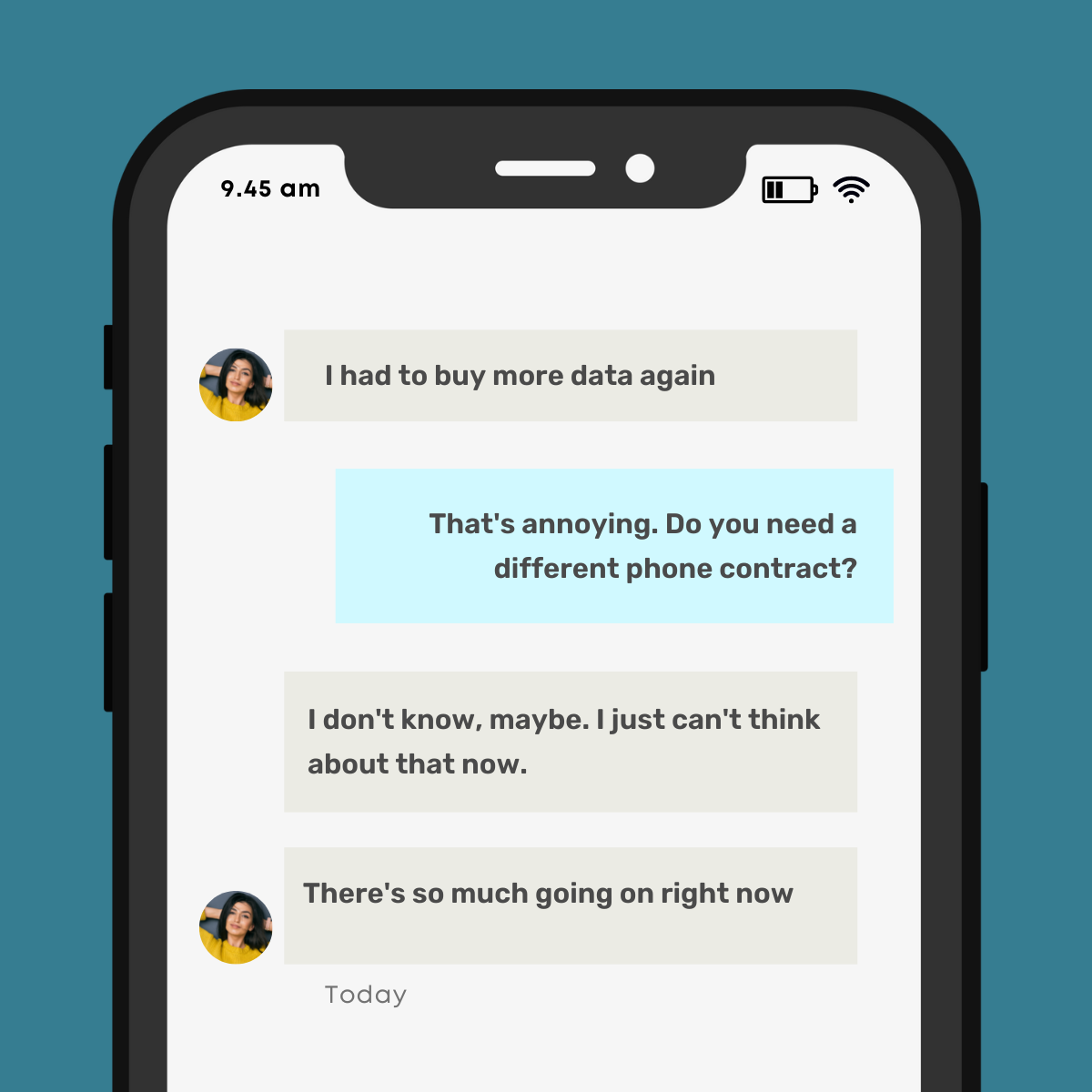Not all customers are created equal: why cheaper internet isn’t always a choice
Kat Dixon is a research fellow with the Data Poverty Lab. Over three months, she’s investigating community-led initiatives which enable good access to the internet for people experiencing data poverty. These blog posts track her journey and thinking.
Decisions, decisions
You walk into a phone shop. You look over the shiny handsets, pick some up. It’s a sunny day and your boss is taking a long lunch. You’ve got time to browse before heading back to the office.
An assistant comes over and talks you through the packages. Memory. Minutes. Texts. Speeds. Megabytes. Megabits. They show you their tablet with what appears to be infinite combinations of these things, at different prices, with different contracts lengths. 18 months, 24 months. 20GB. 200GB. Which one is reasonable? You feel hot and confused. You think about coming back tomorrow when you’ve had more time to think.
Now, reverse back, and picture yourself walking into that phone shop again.
It’s 4.45pm. You’ve been at work since 7am in a warehouse. Your body is tired. You need to get this phone thing sorted – your two daughters are falling behind in school because they’re struggling to do their homework on your broken phone.
You cancelled the broadband, you can’t afford it. You’ve got a gas bill in your bag which is a third bigger than your last one. You’ve started limiting TV time, to save on electricity. You’ve stopped buying ketchup and ice cream. The kids are cross with you. You’re worried about getting less hours at work next week.
Now look through those contract combinations with the assistant again. Feel the urgency to get this right. What’s a Gigabit? How many do they need to get the schoolwork done? Which is cheapest? What if you run out of data? What if you can’t afford this next month?

Competitive markets and consumer behaviour
In internet provision, a competitive market has been used to drive down prices. And arguably, for the majority of the population, this has worked. Compared to other European countries, we have pretty low average prices to access the internet.
But the baseline cost of the internet remains unaffordable for many people, which locks them out of modern life. With public services and daily living increasingly digital-first, this is more than a market problem.
And the complexity of mobile and broadband internet tariffs doesn’t affect everyone the same way – it can disproportionately penalise low-income workers.
Consumer biases affect us all, but these can be exacerbated by financial worry and other pressures.
Common consumer biases:
- Choice overload: we are more decisive when offered limited choice. Choosing between 6 brands of ketchup is easier than 15. Too much choice, we get overloaded, shut down and don’t buy anything.
- We prefer default to change: the default heuristic (a mental shortcut) encourages us to be risk-averse in most decision making. So we’re more likely to stick with our existing mobile provider than switch for a better deal. This is due to lots of factors – but partly because the human brain is wired to stick with what we know.
- Information presentation: If certain information is highlighted, we behave differently. A bank in Australia changed their credit card bills to highlight in dollars, not percentages, what penalties would be. And that one change meant more people paid it off.
Extra weight on your brain
These biases can have increased influence on our decision making when we’re worried about money or face other pressures. It’s well documented that our cognitive function diminishes when we are preoccupied with financial pressures. So when you’ve worrying about money, you’ve got less brain power to problem solve your way out of it.
Higher risk, bigger stakes
If the stakes are higher and your situation provides less tolerance for error, you are also less likely to take a risk. People in lower income brackets are less likely to switch internet provider, even if they knew they’d save money, because of the fear of losing internet access or facing a gap.
For example, if you have an urgent online medical appointment, and there’s a chance if you switch provider you’ll miss it, the risk can feel too great. Or if you need to demonstrate Claimant Commitments to the Job Centre, to claim Universal Credit, the risk of switching might not feel worthwhile.
Poverty premiums
The poverty premium is the extra cost people on low incomes and in poverty pay for essential products and services. On average, mobile internet is more cost-effective if you buy contract deals with data packages. But if your hours change week to week, and you don’t know how much money is coming in next month, committing to a contract isn’t possible.
Pay as You Go top ups are often expensive, but are more manageable if your budget is tight. I see many reports of people on low incomes using a basic mobile package and then paying huge amounts in data top ups. They would be better off switching to a different deal, but the system feels too complex to navigate, the risk can feel too high or they simply don’t have headspace to engage with the switching process.
It’s worth remembering that accessing some public and social services are data hungry. I spoke to a SIM card donation initiative recently who gave out a pre-paid SIM card to a woman. She used the entire data package in a single day from speaking to a counsellor over a video call.
Loyalty penalties
If you agree a contract with a mobile company for the handset and data for 24 months, after that 24 months expires, you carry on paying the same price. This is an example of a loyalty penalty, which happens in insurance, mortgages and other markets.
Citizens Advice estimates that since 2018, when they made a super complaint to regulators about this issue, consumers have over paid £182 million in mobile costs and £485 million in broadband. That money isn’t paying for a service – it’s a penalty for not switching your plan. And for the reasons above, and more besides, this hits low-income customers harder.
So what can be done about it?
The fellowship work I’m doing is seeking good examples of community-led initiatives which tackle data poverty (get people good access to the internet). We want to find ways to scale the initiatives regionally or nationally and get more people online to bridge the digital divide.
Social tariffs – cheaper broadband and mobile tariffs for low income earners – feel like a great option. But if we want to create equity and proactively bridge the digital divide, we cannot assume that the customers who need it most, will find it.
Many people eligible for a social tariff don’t know it exists. And if they did, would they have the headspace or risk appetite to switch?
In building solutions, we need to understand data poverty as a social issue, as much as a consumer or technical one. And that not all consumers are created equal.
The Data Poverty Lab is formed by Good Things Foundation. All views expressed here are Kat’s own.

Kat Dixon
Data Poverty Lab Fellow
Kat Dixon is a digital inclusion advocate and one of our Data Poverty Lab Fellows, exploring community-led solutions to data poverty. Kat is Director of Partnerships at national charity Catch22 and has built digital skills and inclusion programmes with TikTok, Microsoft, Salesforce, Raspberry Pi and more. She champions inclusive co-design, the power of public-private partnerships and the transformative possibility of digital access. Kat previously scaled international healthcare innovations in the UK.
